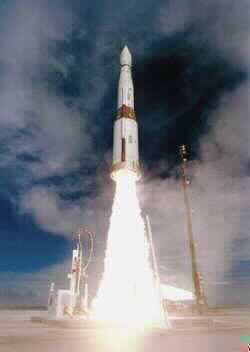US President George W. Bush said that the United States will field a limited missile shield by 2004 to protect against the "catastrophic harm" of an attack by terrorists or nations like North Korea."Today, I am pleased to announce that we will take another important step in countering these threats by beginning to field missile defense capabilities to protect the United States, as well as our friends and allies," he said.
Bush said in a statement that the plan -- which has drawn fire from China and Russia -- would begin with the deployment of ground-based and sea-based interceptor missiles, Patriot missiles, and sensors based on land, at sea and in space, all devoted to the task of shooting down incoming enemy missiles.
US officials who declined to be named said that the blueprint called for 10 ground-based interceptor missiles at Fort Greeley, Alaska, by 2004, and another 10 interceptors by 2005 or 2006.
Defense Secretary Donald Rumsfeld acknowledged that the system will be deployed before it is fully developed, but that by 2005 it will be able to stop "a relatively small number of incoming ballistic missiles, which is better than nothing."
Separately, Britain and Denmark said that the United States had requested permission to use radar sites in England and Greenland as part of the detection network for the missile shield.
The announcement, which fulfills a 2000 campaign promise, comes amid talk of possible war with Iraq and heightened US concern over North Korea's resumed nuclear weapons program and missile exports.
Bush, who has grouped Iraq and North Korea with Iran in an "axis of evil," has warned of the threat posed by such so-called "rogue states" and their potential alliance with terrorists like those behind last year's September 11 attacks.
Bush gave the program the green light despite the failure of a test missile to hit an incoming dummy long-range missile over the central Pacific Ocean in the latest US missile defense experiment.
Moscow has vehemently opposed the plan since Washington withdrew from the bilateral 1972 Anti Ballistic Missile (ABM) treaty, doing away with a linchpin in arms control in order to go ahead with developing missile defenses.
The original missile defense plan -- dubbed "Star Wars" by its detractors -- was originally put forward by former US president Ronald Reagan
PHOTO CAPTION
A payload launch vehicle is launched from the Army's Kwajalein Missile Range in the central Pacific Ocean during a Ballistic Missile Defense Organization test in this July 8, 2000 file photo. (AP Photo/Missile Defense Agency, Fil
- Author:
& News Agencies - Section:
WORLD HEADLINES


 Home
Home Discover Islam
Discover Islam Quran Recitations
Quran Recitations Lectures
Lectures
 Fatwa
Fatwa Articles
Articles Fiqh
Fiqh E-Books
E-Books Boys & Girls
Boys & Girls  Hajj Rulings
Hajj Rulings Hajj Fatwas
Hajj Fatwas














